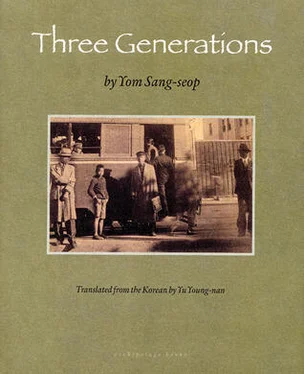The old man would be the first to admit that he’d taken several dubious paths. First, at the age of forty, he grabbed hold of a government position by paying twenty thousand nyang, four hundred won in today’s money, amid the confusion of the 1905 Protectorate Treaty with Japan. So, although the position was bought, his current title, Adviser, was not totally unjustified. Second, he took in the Suwon woman six years ago, soon after his wife’s death. The cost, twenty thousand nyang, was nothing to sneeze at, but the woman had given him a daughter — Gwi-sun — and if he hadn’t taken such measures, there could be no dream of a son mourning him when he dies. All things considered, the cost of the Suwon woman had been worth it. Taking over the genealogy office was the old man’s most recent indulgence. This time, he was drawn into a major venture, and spent as much as two hundred thousand nyang, ten times the amount he’d spent on the Suwon woman, to create the genealogy center. It is difficult to belittle the venture, even if it went against the spirit of the times. Though Sang-hun didn’t particularly object to the genealogy office, neither did he feel any urgency to promote the new project. However, when his father put up a precious four thousand won in an effort to worm himself into this particular faction’s genealogy book, Sang-hun thought he was definitely off his rocker.
Buying yangban status! It was humiliating to Sang-hun.
But the old man didn’t mind spending the money, and he believed he could reconcile his dignity with the spirit of his father because he had earned the money himself rather than using the thousand nyang his father had left him. When a man was successful, he could arrange to confer posthumous government titles on his father and grandfather. Instead of laughing at him for spending money to become a yangban, wouldn’t it be better for people to think he was a dutiful son? In any event, he had used the money to install the signboard on his grand gate with the same sincerity with which he might transfer his ancestors’ spirit tablets to a new location. The genealogy book was printed, with his name listed as a descendant of the eldest son’s branch of the _____ Jo clan. People now began to talk about clearing the grave site of Grandfather ______, the progenitor of this branch of Jos, after hundreds of years of its having lain in waste. They planned to erect a house on the site, bigger than the grave keeper’s hut, something like an old-fashioned academic hall.
Replacing the worn-out stone statues in front of the graves, the pavilion at the grave, the paddy for ceremonial rice. these projects would require a budget of ten thousand won. The Jo clansmen said they’d all chip in to cover at least half the cost, and the old man was to put up the other half.
When adopted, an individual gains the right to inherit assets, but if his adoptive parents are poor, he assumes the obligation to support them. There wasn’t anyone else in this particular Jo branch who could donate money. They had begun the project and fully expected the old man to go through with it. Although they promised to come up with their half, the pledge was clearly just a way of setting the bait and wringing the rest of the money from him. Unfortunately, this had been their intention all along. The Jos visited the old man frequently and bowed to him with deference and ulterior motives. The old man couldn’t bring himself to refuse them. He had been putting it off, first telling them to wait until after the harvest and then until spring. That spring was just around the corner. After Lunar New Year’s, less than three months away, came Hansik, the Cold Food Day.
Very recently, the Jos had sent Chang-hun, whom the old man trusted most, to advocate for their campaign, for they hoped they could move forward with the project as soon as the Hansik rite was over.
The old man said it would be rather difficult, with the price of rice having hit rock bottom, and suggested that the construction be put off until Chu-seok, the Harvest Moon Festival, or until the next Hansik.
The old man was by no means naïve. On the contrary, he lived the better part of his life counting money with his arithmetic sticks and his abacus.
Secretly, he was grumbling about one large sum or another he had recently spent. Meanwhile, the Jo kinsmen were idling away their time in huge gambling parlors, even as their stomachs growled from hunger, or were spending their days playing go, holed up in someone’s outer quarters. They tried to squeeze anything they could out of the old man, using the pretext of the genealogy book since they couldn’t find any other way to make him loosen the strings of his money pouch. Now, Grandfather ______ was the latest fodder for the discussion of the five thousand won. Those who maintained that five thousand would be necessary for sprucing up the grave figured that by asking for five thousand, they’d end up wringing three thousand out of him, and the old man, for his part, was prepared to offer half of the five thousand. He regarded the grave renovation as a sort of commemorative project that he’d leave behind, now that his death was drawing near. He was the savior of the Jo clan after all, wasn’t he?
This was why, under his relatives’ incessant urging, he had recently pledged an initial thousand won, five hundred for landscaping and the rest for building a grave keeper’s hut. He added that the rest of the Jos should chip in with the remainder, either with money or with labor, such as transporting dirt and grass.
He then told them that he’d buy some paddies at a later date to harvest rice for ceremonial purposes. With this maneuver, Adviser Jo calculated that he might get credit for spending two thousand won while donating only a thousand.
“But Uncle says he’ll contribute only a thousand,” muttered Chang-hun to himself after sitting quietly for quite some time. “We’ll end up running all over the place collecting money to complete the project. Really, how can we just abandon it midstream? We’ll end up dead tired, and if something goes wrong, we’re the ones who’ll get the blame. ”
“Looks like you’re doing great work,” Sang-hun retorted. “So, did Grandfather ______ actually ask you to build a grave keeper’s hut? Did he tell you he was lonely without a stone statue at his grave?”
With great difficulty, Sang-hun managed to refrain from using a verbal ending that would have indicated his lack of respect for his cousin. Bringing up Grandfather ______’s name was rather awkward. It wasn’t because, as a Christian, he was unable to show respect for his ancestors, but rather because this was a totally unknown “grandfather” from some ten generations back, a man whom his father had posthumously adopted.
“How can you think of saying things like that? You may disagree with some of the traditions since you’ve become a Catholic, but bear in mind, we wouldn’t be alive today without our ancestors. Who in the world doesn’t care about his ancestors? We’ve got to make sure the Jos don’t lag behind other clans and ensure its prosperity from generation to generation.” Chang-hun had no compunction about grating on Sang-hun’s nerves. He disapproved of him anyway.
Sang-hun bristled. “The prosperity of the Jo clan? Surely this ancestor that we’ve conveniently borrowed will reserve his blessings for his natural descendants before us. ” He was about to continue when the room suddenly grew quiet at the sound of the old man clearing his throat coming from the edge of the veranda.
“What’s all this commotion?” The old man flung open the door. The young men in the room scrambled to stand up, and Sang-hun, who was sitting on the warmest part of the floor, shifted to a cooler spot.
Cigarette smoke escaped through the doorway, along with warm air.
Читать дальше












